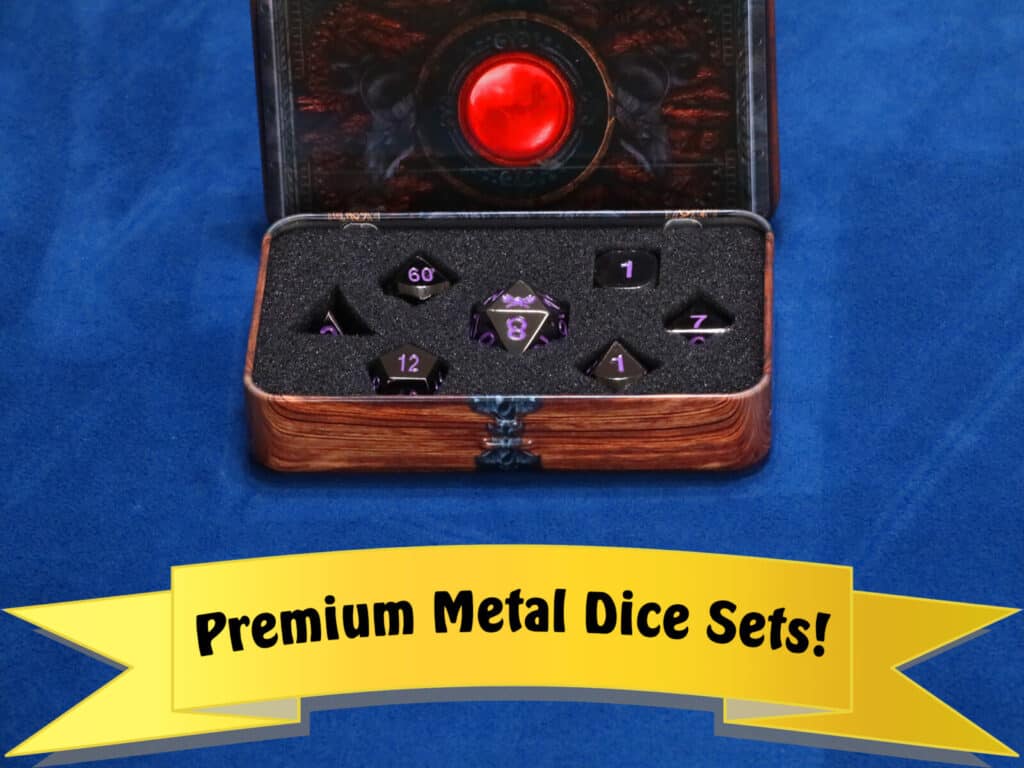Keen Mind is a really interesting feat in 5th Edition Dungeons & Dragons because it might be the hardest feat to grade in all of 5th Ed. Because I’ve seem campaigns where this feat was heavily OP an did a ridiculous amount of work for the party, to the DM’s consternation and I’ve been in campaigns where this was a completely and utterly worthless feat.
You know the old saying about poker that you don’t play the cards, you play the player? That idea definitely applies to the keen mind feat which can be an A-grade feat or an F-grade feat and the main factor as which one it is? The game’s DM.
In 5E keen mind is an intelligence-based feat that makes a player master of time, place, and memory. A player with the keen feat gets a small boost to Intelligence, always knows which way is north, how long it is until sunrise/sunset, and remembers everything seen/heard in the past month.
So when is keen mind worth picking up as a feat? When should a player ignore it completely? I have all the answers you need from my years as a player and DM in 5E.

Breaking Down the Keen Mind Feat
The only way to know if the 5E keen mind feat makes sense for your character is to first understand each part of what the feat offers, and what it doesn’t. This information is crucial before making a choice on whether or not the campaign you’re in would be an appropriate place to break this potential bad boy out.

Directly from the Player’s Handbook (p.167):
You have a mind that can track time, direction, and detail with uncanny precision. You gain the following benefits.
- Increase your Intelligence score by 1, to a maximum of 20
- You always know which way is north
- You always know the number of hours left before the next sunrise or sunset
- You can accurately recall anything you have seen or heard within the past month
Some very situational/mediocre buffs, a good little stat boost, and one potentially very powerful benefit that can even teeter on game breaking in the right campaigns.
So let’s break down each benefit one by one.
Benefit #1: Stat boost of +1 to Intelligence to a maximum of 20.
Solid bit of a stat boost. Since you are giving up an ability score improvement, it’s nice to recover some of that. For a wizard with an odd number INT, or otherwise the main investigator of a non-wizard party, getting the odd number INT to the next even number to up the bonus is a pretty good feature. Especially since many great skills fall under the Intelligence stat.
Benefit #2: You always know which way is north.
Very situational. This can be powerful in wilderness heavy campaigns or as a way to make up for a lack of a good scout (rogue, ranger) in the party, but it’s also one of those meh ones that can also be useless in other campaigns.
Benefit #3: You always know how many hours are left before the next sunrise or sunset.
Generally not going to be super useful, except for those campaigns with super situational moments where this could become very useful. Especially when dealing with undead, life-threatening cold in a survival campaign, or otherwise needing to know how much time you need before you can accurately scout or move past your DM’s custom b.s. that explodes at nightfall and ends at sunrise.
Or vice-versa if they are extremely creative in an out of the box sort of way. However, normally this will not be very useful in your average campaign.
Benefit #4: You can accurately recall anything you’ve seen or heard within the past month.
This tends to be the biggest benefit of the keen mind feat, and short of an old fashioned hack and slash dungeon crawl, it’s actually a really good one. Especially when dealing with DM’s who like in-depth stories that involve dropping of hints, relies on story telling with details, or is big in foreshadowing.
These are generally traits you find with story-telling DMs – ones who love the details, the political intrigue, the twists of a really well setup story. If you have a game master running a 5th Edition Dungeons and Dragon game that fits that mold then this is definitely a feat to think about.
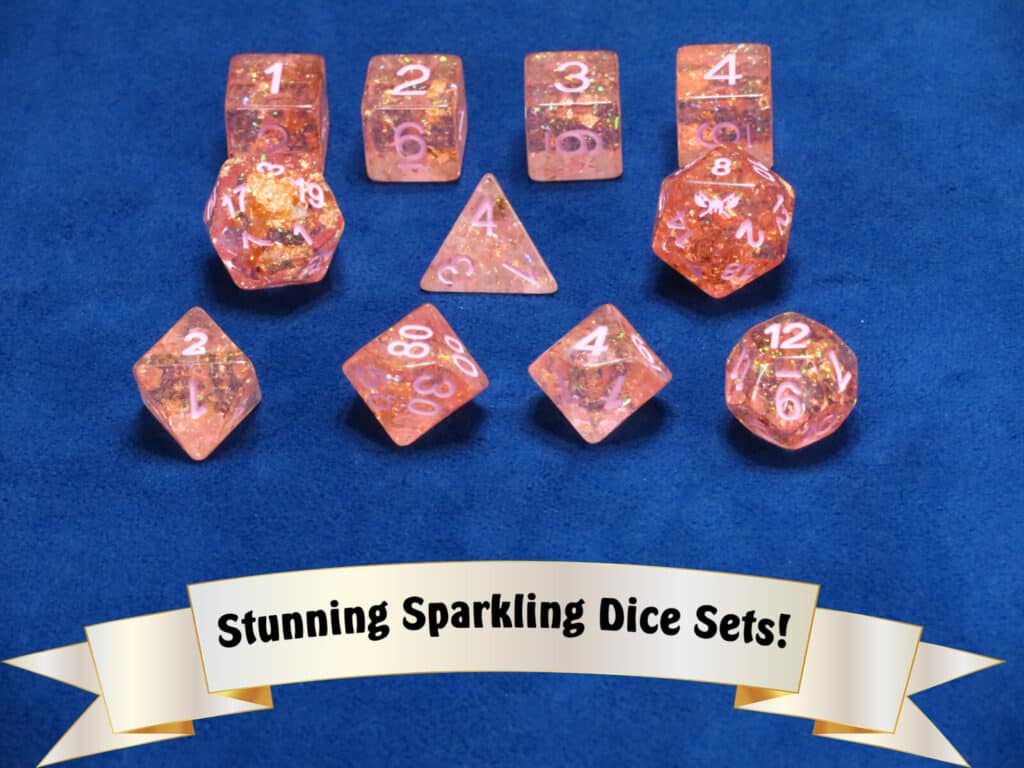
5E Classes That Should Seriously Consider Taking the Keen Mind Feat
In this case always might be a bit strong of a word, especially depending on the style of campaign that is being played. However, there are some classes that both for mechanical and role playing reasons may fit together with keen mind very well. Wizards, Rangers, and Rogues all are most likely to use this feat.
In fact, many people saw the power of a player having keen mind with a story-telling DM when in Season 2 of Critical Role Liam O’Brien used it to great effect to trip up, stay ahead of, and avoid the worst plot boomerangs Matt Mercer could throw early to mid-game.
For a wizard, this is a class that prides itself as masters of the arcane, needs intelligence as a major stat, and it makes sense they would have a near photographic memory at least in the short-term. This adds sort of a Sherlock Holmes type element to wizards that Dresden fans will certainly appreciate. That makes keen mind a good feat for 5e wizards who will also often be doing the heavy lifting for a party’s investigation, note taking, or research.
The two sneaky classes of ranger and rogue are both also excellent options for taking this feat. Whether sneaking through a maze of back alleys in city streets or fading in and out of view on a tight schedule or traveling through dangerous wilds, understanding directions and having a clear line on sunrise/sunset make a lot of sense. A strong memory could be important for survival.
This means from a roleplaying perspective this feat makes perfect sense. In this case that might even be more helpful than the +1 Int, but if that stat boost gets a normal dump stat up to average or the next even number, all the better in that situation.
Mechanically the keen mind feat might make sense for Artificer as Intelligence is their main stat and it’s not hard to imagine a photographic memory being an important part of being able to put together all these magic-based contraptions.
Match the keen mind feat with the Sage background (researcher perk) to maximize its effectiveness!
5th Ed Classes that should seriously look at the Keen Mind feat in 5E
- Artificers
- Rangers
- Rogues
- Wizards
5E Classes That Situationally Should Consider Taking the Keen Mind Feat
At this point it’s more about roleplaying than mechanics. None of these classes inherently have a reason for wanting the +1 Intelligence or needing the ability to track the time of day or north direction (except maybe the Druid). For these classes it’s all about if they are the one sort of acting as the note taker, the group scribe, or the investigator/problem solver.
The main benefit of the Keen Mind Feat is the ability to clearly remember what was heard, read, or seen over the past month. That’s true in most campaigns, but it will be especially true with any of these classes that don’t instinctively think about keen mind as a feat that makes sense.
5th Ed Classes that should consider taking the Keen Mind Feat
- Bard
- Cleric
- Druid
- Monk
- Paladin
- Sorcerer
- Warlock
5E Classes That Should NEVER Take the Keen Mind Feat
There are a couple classes where intelligence is almost certainly a dump stat, and they are the same classes where having an intellectual character just usually doesn’t make sense. Not as a roleplaying situation and not mechanically.
Two two really obvious classes that fall into this group are your standard “Tank and Thwack” classes of barbarian and fighter. There’s virtually no reason to ever take keen mind with these classes, especially with the other feats and benefits available to these classes.
5th Ed classes that should never take the Keen Mind Feat
- Barbarian
- Fighter
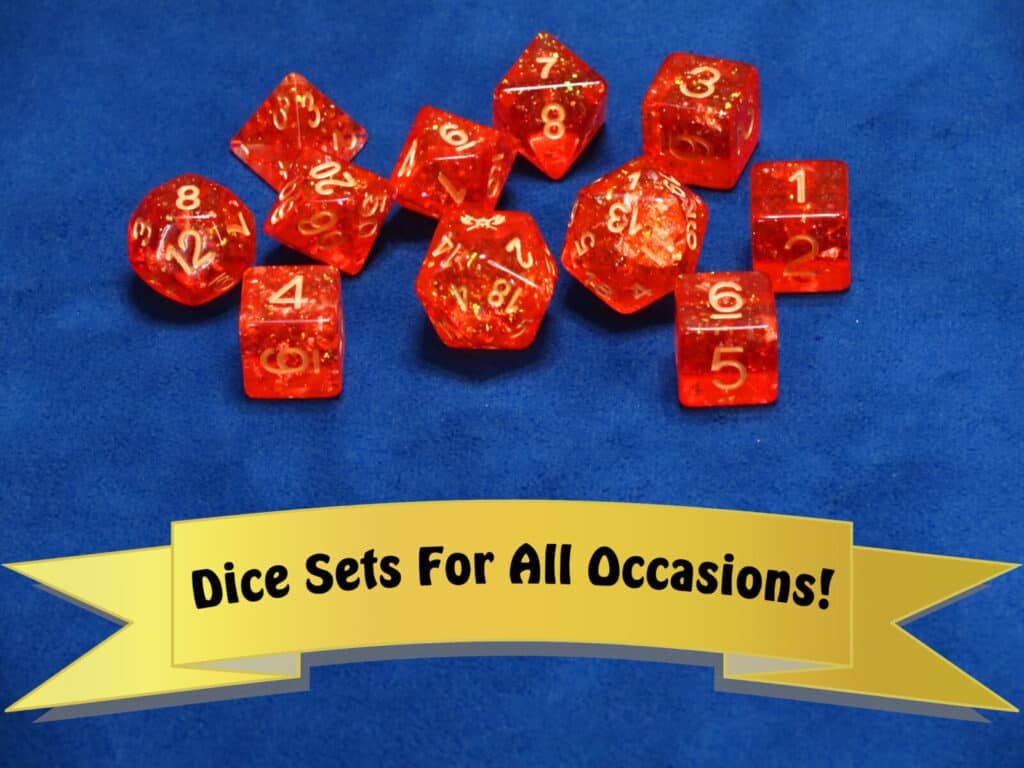
Final Feat Grade for Keen Mind 5E
Keen Mind Feat Grade: C+
Is the 5E Keen Mind Feat Worth It?
This is a really hard call, and honestly it was the hardest grading decision I’ve made up to this point. In certain types of games it is clearly an A level feat. However, in many games it is an F. In some others it has some nominal use but overall is mediocre. So what am I supposed to with regards to grading?
The reason it’s not a B is because I believe in my experience it is useful in a serious way less than half of the time and it is useless far more often than it is game breaking. Because of that C+ seems like the right place to put the grade. If you have a detailed story-telling DM who relies on detail, nuance, and in-depth story then keen mind could be an extremely powerful choice.
If you’re used to hearing the following things from your DM:
- Roll to see if your character remembers that conversation
- I gave you that document two sessions ago…
- In-game your party had all the hints three weeks ago…
- Roll to see if you recall
If those ever pop up that’s all the more reason that for the right character in the party that keen mind might be a great choice for a feat. In that case, the grade on this might be an A. To be honest, players in my campaign should almost certainly have one player who takes this feat.
But if you’re in an old school Yawning Portal dungeon hack and slash, you can move the grade down to an F.
HELP! I’m DM How Do I Stop Keen Mind from Breaking my Game?
The question of how to handle Keen Mind in 5E as a game master is one of the most common questions that comes up in regards to this particular feat. The good news is I can definitely help with years of experience as a DM. The main focus here will be on the recall section as knowing the direction of north or when a sunrise/sunset shows up generally won’t be an issue in all but the strangest situations.
Many times when DMs struggle with a feat like Keen Mind it’s because they overestimate what it actually does. So let’s look at what keen mind does and what it doesn’t do.
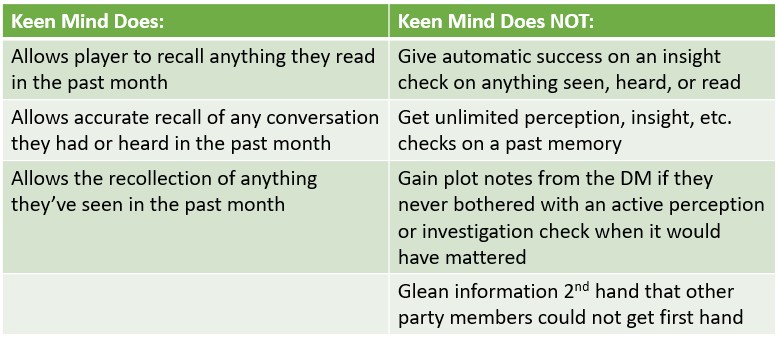
Keen Mind Does
- Allows recall of anything read in the past month
- Allows accurate recall of any conversation in the past month
- Allows the recollection of anything you’ve seen in the past month
Keen Mind Doesn’t
- Allow automatic passing of an insight check on anything read, heard, or seen
- Allow a player to gain excess information from what another party member told the party (Example: The barbarian sees a robed figure with trinkets but failed his insight check when seeing jewelry/magic items – the wizard doesn’t automatically pass and have that info. If the barbarian didn’t know it was important he/she might not have mentioned it and at the very least it may require one or more perception/insight/luck rolls to see if the barb had enough info for the wizard to Sherlock Holmes that situation – it’s not a given)
- Gain plot notes from the DM if they forget in character to ask for perception or insight check during the previous engagement
- Automatically pass investigation, insight, history, perception, or arcana checks
Some of these might sound like semantics, but it’s actually very important to understand these differences. Because that’s the difference from the 5E keen mind feat being very effective and being a game busting feat.
Seeing, reading, and remembering is powerful and when it comes up it should be a strong feat. However, that shouldn’t be something that breaks your entire campaign.
- Just because you see something, doesn’t mean you perceive the important details
- Just because you perceive something, it doesn’t necessarily mean you have insight into what it means
- Just because you know something is off, doesn’t mean your investigation gives the answers needed
- Just because something is noted doesn’t mean an automatic arcana check success or history check success
Keeping these details in mind helps make this a good feat that isn’t going to break the game for the GM. Learning how to narrate a particular way can also help. Suppose the player fails an arcana check. You can say:
Because of your keen mind feat you recall seeing an amulet that gave off a powerful arcane feeling, but for whatever reason you just can’t put together exactly what that power or feeling meant.
That gives the player a nod for keen mind (you get this chance because of keen mind) but makes the check important (failed arcana check = you can’t piece it together). The wording here also puts down a tone of finality of “No, you can’t just keep re-rolling the check because you remember it perfectly. The extra meaning just isn’t there.”
Practicing these things means you are prepared for every scenario. And if the keen mind wizard won’t stop rolling 20’s, hey, it’s their session. Let them shine!
Creative way to make keen mind useful while still messing with the player: Put them in a cave where you describe smooth walls and hallways, and they go into it a ways before realizing its a labyrinth. Have the walls hit the ceiling to avoid “flying cheating.” Then make it a Minotaur maze. Let them realize something is up by telling the keen mind player “North is straight ahead.”
Before they move too far down the hall say “Strange, you realize north is now straight behind you.” If they back track, make north left or right.
This messes with them for taking the feat, while not doing harm, and lets you have some fun with them (throw in a cheeky deep gnome telling them just go north until you get out to rub in the salt) and yet acknowledges the feat while having fun with it. And that player still might not know what’s going on.
He/she needs to pass an insight or history check for that 🙂
Observant Vs Keen Mind
Observant is a very powerful feat in and of itself, and honestly it can become an absolute monster when combined with keen mind. Especially in the earlier mentioned campaign styles where keen mind tends to be useful. Why is this?
Well take all the benefits that keen mind gives, especially with the recall ability, think about the limited tools DMs have to keep it from getting out of hand, and then add these from the observant feat:
- Increase Intelligence or Wisdom by +1
- If you can see a creature’s mouth while it is speaking a language you understand, you can interpret what it is saying by reading lips
- You have +5 bonus to your passive wisdom (perception) and passive intelligence (investigation) scores
Considering how many understand language spells there are, or the helm of comprehend languages, adding that bonus to perception and investigation, along with lip reading, that makes the keen mind + observant feat combo potentially incredibly powerful.
In certain campaigns, it can be OP to the point of being broken, especially if your information gatherer is a class like rogue, which tends to have very high perception, and decent to good investigation and insight skills.
So if you can get both as a player, that is an incredibly powerful setup.
But what if only one can be picked? If you have to pick one or the other, which is the best?
As a general rule of thumb, observant is always strong by itself. It will provide a lot of value in any campaign. Keen mind tends to be situational so if in doubt, or if you don’t have a full read on the DM, then go with observant.
This will almost certainly become a full article in and of itself, which I’ll link to once done, but this at least shows you the power of both or how to look at one versus another.
Keen Mind Feat FAQ
How good is keen mind 5E?
Keen mind is a feat of variable value in a 5th Ed D&D campaign. Generally speaking, it’s a good feat for rogues and wizards in detailed story games and not useful at all in hack and slash low detail stories.
How do DMs deal with the keen mind feat?
Perception, insight, investigation, history, and arcana checks are a DM’s best friend when dealing with the keen mind feat. In general the keen mind feat is not game breaking when properly used and adjudicated in-game.
What are the uses for keen mind feat 5E Dungeons & Dragons?
Keen mind feat can work very well for tracking, scouting, or recalling important details in a story-heavy campaign.
Can Keen Mind replace the spell book for a wizard?
Keen mind can not replace a spell book for a wizard as the rules are written, but its features does potentially allow some limited flexibility for a 5e wizard for a limited amount of in-game time (four weeks) if the DM agrees to it.
This is actually a really interesting potential way to use keen mind, and there are some pros and cons with this one. I assume this would generally come up in a “spellbook was stolen” scenario, though I could see some creative players attempting to use this as a full-time workaround.
However, it makes an important assumption that shouldn’t be made: Anything Seen = Memorizes Everything Read
Which is one of those strong assumptions that doesn’t necessarily apply. Who says? This guy:
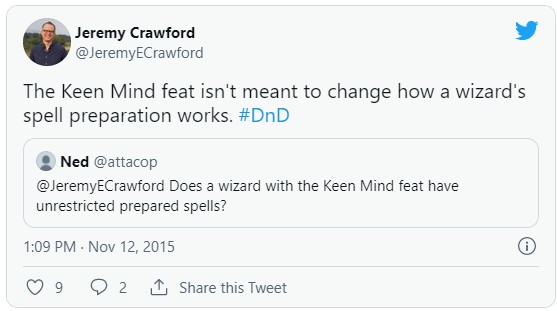
So the answer is no, however for people who play homebrew heavy games or pretty loose with the rules, here is how I might allow some mischief vis a vie wizards with keen mind:
I’m going to put down my interpretation as DM based on how the feat is written, but keep in mind that you should talk about this application with your DM since they have the final say.
- The wizard has any spells available they had the last day they prepped their spells
- Any spells transcribed the last 30 days are available to switch in or out during that time period
- Any spells transcribed the last 30 days before the spell book was lost or stolen could be transcribed into a new spell book at the reduced gold cost rate (as if you were making a backup)
- The wizard still needs a new book within 30 days or that knowledge will need to be recovered
This is one of those unique scenarios that is just meant to be up to the DM based on game, group, story and overall comfort levels. If you want a sure-fire way to improve your wizard’s spell list, take a look at the Magic Initiate Feat or the 5E Metamagic feat.
This will probably end up being a full article at some point seeing as how it can create a really interesting debate at a table.
Other DnD Articles You Might Enjoy

Proud to embrace the locally created moniker of “Corrupt Overlord” from one of the all time great Lords of Waterdeep runs, Shane is one member of the Assorted Meeples crew and will be hard at work creating awesome content for the website. He is a long-time player of board games, one time semi-professional poker player, and tends to run to the quirky or RPG side of things when it comes to playing video games. He loves tabletop roleplaying systems like Dungeons & Dragons, Pathfinder, Werewolf, Fate, and others, and not only has been a player but has run games as DM for years. You can find his other work in publications like Level Skip or Hobby Lark.

